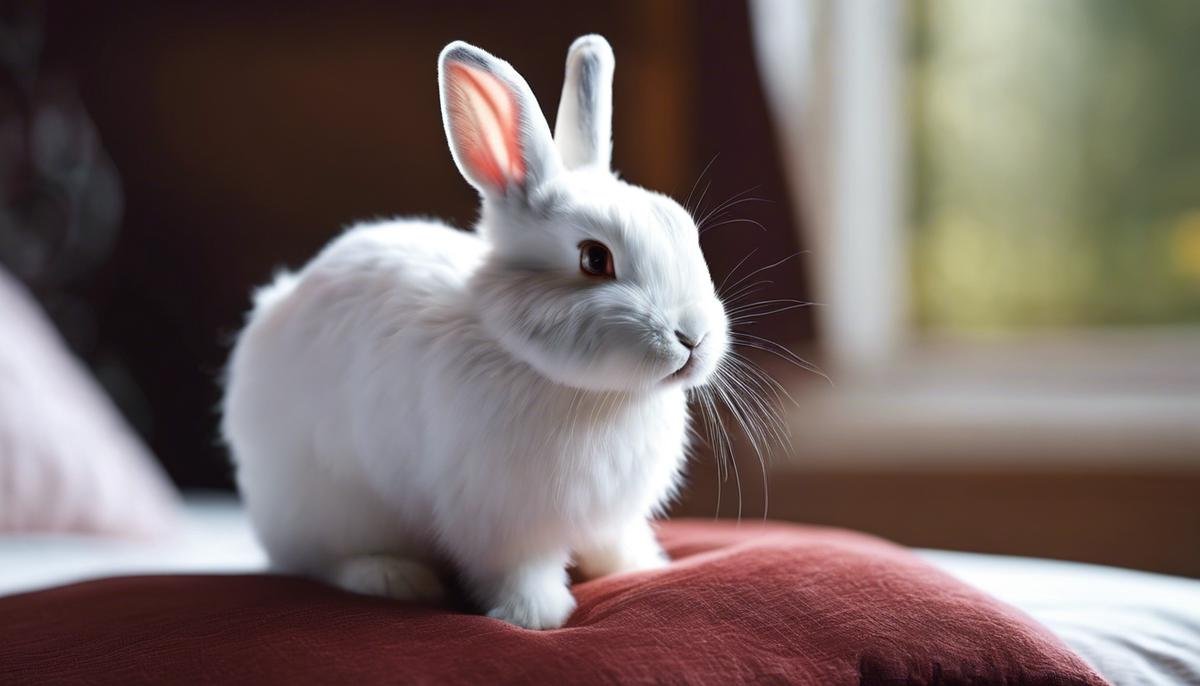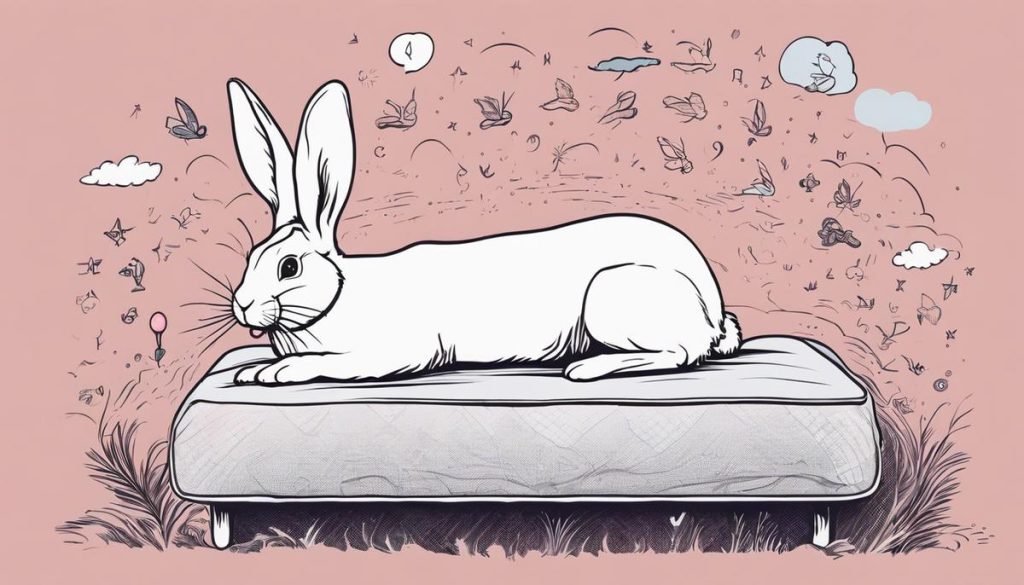For many, the bond shared with their pet rabbit is one of great joy and companionship. These furry little creatures indeed hold a special place in our hearts. However, there might come a time when their actions perplex you, especially when they start peeing on your bed. This peculiar behavior often leaves their owners confused and seeking answers. How can one understand the secret language of these small animals? In order to decode this conundrum, we delve into the rabbit’s psychology and behavior, recognizing that their urination habits might be an expression of their emotions or a gesture to mark their territory. The following discussion will also explore health-related factors that may compel your rabbit into inappropriate elimination patterns and suggest tactics to correct this behavior.
Rabbit Psychology and Behavior
Understanding Your Rabbit’s Abnormal Toilet Habits and How to Cope.
We all know that keeping pets can be a very rewarding experience! Their little antics and unique personalities fill our homes with joy and laughter. But what happens when your fluffy bunny friend starts showing strange toilet habits? More often than not, rabbit owners are left scratching their heads, wondering, “why is my bunny behaving this way?”
Consider this: much like humans, rabbits have their unique habits and characteristics. Sometimes, these traits can manifest as abnormal toilet behaviors. Understanding these behaviors and knowing what to do about them is key to maintaining a healthy rabbit and a clean home.
Inconsistent Litter Use
Perhaps one of the most common issues owners face is inconsistent use of the litter box. The first thing to check is whether your bunny is neutered or spayed. Unneutered males and unspayed females often mark their territory by spraying urine – yep, not the most pleasant thing, but it’s nature’s way! Try having your rabbit spayed or neutered to encourage consistent litter use.
Importance of Diet
A rabbit’s diet plays a vital role in its toilet habits. If their diet is inappropriate or inconsistent, it can lead to messy, irregular bowel movements. A healthy rabbit will produce small, round droppings. If the droppings are larger, softer, or irregularly shaped, it’s time to review your rabbit’s diet.
Remember, rabbits thrive on a fiber-rich diet, primarily of hay (timothy, orchard, or grass hay), with some fresh fruits and vegetables for variety.
Stress and Sudden Toilet Behavior Changes
Rabbits are sensitive creatures. If there are sudden changes to their environment or routine, they can get stressed, leading to changes in their toilet habits. If your rabbit starts to exhibit strange toilet habits suddenly, try to identify any recent changes in their environment or routine, and correct them as needed.
Aging and Health Issues
As your rabbits age, they may struggle with mobility, which might affect their ability to reach the litter box. On occasion, abnormal toilet behavior can even be a sign of common health issues in rabbits like urinary tract infections or dental problems. If your rabbit’s abnormal toilet habits persist even after dietary and environmental adjustments, it’s time to pay a visit to the vet.
Cleanliness
Lastly, one simple reason for your rabbit’s abnormal toilet habits could be a dirty litter box. Rabbits are clean animals that avoid using dirty bathrooms. Hence, regular cleaning of their litter boxes is crucial in promoting effective litter habits.
In Conclusion, rabbits are charming little creatures that light up our lives with their adorable antics. Understanding and tending to their needs, even when it comes to their unexpected toilet habits, is just one of the many ways we demonstrate our love and care for them. With patience, love, and the right knowledge, adjusting to a new rabbit’s toilet habits or altering an old friend’s can be easier than you think.

Health Issues Leading to Inappropriate Urination
Understanding Your Rabbit’s Behavior: Is Feline Health Impacting Their Potty Habits?
Living harmoniously with our lovely fur babies sometimes presents unexpected challenges. One of the major issues could be when your previously well-behaved bunny starts making your bed its new restroom. This situation may leave you puzzled, especially if you’ve been diligent about cleanliness, provided a good diet, and ensured that your pet’s litter habits remain consistent. Unfortunately, there may be underlying health issues at play.
Medical complications can undoubtedly cause a shift in behavior as your rabbit may be unable to control their toilet habits due to various health problems. Your rabbit might be trying to communicate their discomforts through actions like peeing on your bed, which is indeed contrary to their normal routine.
A urinary tract infection (UTI), for instance, can make it difficult for your rabbit to control where they urinate. Frequent urination, and in odd places, is a common symptom. However, UTIs are typically accompanied by other signs such as loss of appetite, lethargy, and blood in the urine.
Similarly, bladder stones or sludge in the bladder can result in uncomfortable peeing situations for your rabbit. If you notice gritty urine, it’s a strong indication that your bunny could be suffering from these health issues.
While less common, arthritis might also be contributing to your bunny’s new peeing behavior. As rabbit’s age, movement can become painful. Arthritis-related discomfort could deter your rabbit from hopping into their litter box, hence resorting to more reachable and comfortable spots, including your bed.
Another possible health-related cause is dental disease. This may sound unrelated, but rabbits experiencing dental pain might prefer softer surfaces to help soothe the discomfort from their teeth or mouth, leading them to urinate on softer places like your bed.
Recognizing these potential health issues is the first step towards resolving the problem. It’s critical to seek veterinary care immediately if you notice any changes in your bunny’s behavior or signs of the health problems discussed.
This behavior can be incredibly frustrating, especially considering the harm it can do to your beloved home’s cleanliness. Remember, more often than not, your rabbit isn’t doing this to annoy you. It’s a call for help, a sign that something may be off with their health.
Let’s proactively listen to our furry friends and respond with love, compassion, and the right medical care. Your beloved pet and your clean bed will both appreciate it.

Training Your Rabbit Not to Pee on Your Bed
Training your rabbit not to pee on your bed isn’t just about maintaining a clean house, but it’s also about ensuring the health and safety of your pet bunny. We’re all for creating a harmonious, chic and of course, hygienic environment for our families, right?
Once we’ve ruled out that your rabbit’s troubling behavior isn’t rooted in health issues or age-related concerns, we can focus on the ‘how to’. As responsible pet parents, we wouldn’t want to shirk our duty towards our furry family members. It’s essential to approach the training process with a big scoop of patience and a large helping of consistency.
Begin by confining your bunny. Create a rabbit-safe area that provides ample space for romping about, replete with a litter box that allures your bunny to do their business in it. Use pet-safe fences or playpen barriers to make your bunny understand that the bed is a ‘no-go’ zone.
To up the attraction of the litter box, make sure the litter is fresh and inviting. Rabbits are particularly fond of hay, so establishing a bed of hay in the box might make it more attractive to them.
Just like toddlers, praise works wonders on bunnies too. Make a liberal use of positive reinforcements, showering your bunny with praises or petting them when they use their litter box. With time, these actions become ingrained, helping them understand that good behavior equals rewards.
Deterring them gently from your bed when they jump onto it can be a crucial part of the training as well. Encourage them back into their fenced area, conveying that the bed is not the right spot for their toilet needs. Be kind, patient, and firm in your instructions.
While every rabbit is different and may take varying lengths of times to learn, the use of the methods mentioned typically results in success given enough time and consistent effort.
Remember, it’s essential to keep an eye on any resurgence of unusual peeing behavior, as this could signal a relapse into earlier health issues.
Making sure your bedroom door is firmly closed when you can’t supervise your rabbit is also another practical tip – out of sight, out of mind applies here!
Most importantly, never resort to punishment or negative reinforcement while dealing with your bunny’s improper toileting habits. They do not understand punishment and may start fearing you, damaging the bond you share. Stick to positive reinforcements and be patient, and you’ll soon succeed in training your rabbit to stop peeing on your bed.
From one parent to another, always remember that we are their advocates – their voice. It’s up to us to create a wonderful, worry-free world for them, combining discipline with oodles of love and care. Happy parenting, and happy homemaking!

Ultimately, understanding and managing your rabbit’s behavior requires patience, observation, and willingness to learn. You might need to adjust your reactions based on their individual personalities, health conditions, and personal preferences. While it can be frustrating to deal with such problems, keep in mind that your pet rabbit is not purposely creating these challenges. Instead, this behavior is likely a form of communication or an indication of discomfort that needs attention and care. Always ensure your pet’s well-being is at the forefront while you use varied methods to train them for appropriate toileting. With the right approach, your rabbit’s untoward urination habits on the bed can be effectively managed, leading to happier, healthier times for both you and your furry friend.



